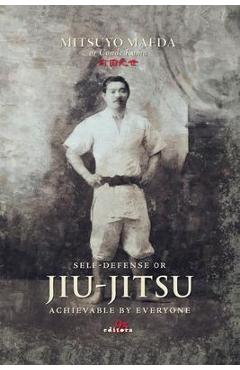Self-defense or jiu-jitsu achievable by everyone - Mitsuyo Maeda

Detalii Self-defense or jiu-jitsu achievable by
libris.ro
178.41 Lei
198.23 Lei
Sports & Recreation
Mitsuyo Maeda
Self-defense or jiu-jitsu achievable by - Disponibil la libris.ro
Pe YEO găsești Self-defense or jiu-jitsu achievable by de la Mitsuyo Maeda, în categoria Sports & Recreation.
Indiferent de nevoile tale, Self-defense or jiu-jitsu achievable by everyone - Mitsuyo Maeda din categoria Sports & Recreation îți poate aduce un echilibru perfect între calitate și preț, cu avantaje practice și moderne.
Caracteristici și Avantaje ale produsului Self-defense or jiu-jitsu achievable by
- Departament: sport-activitati-aer-liber
- Perfect pentru activități sportive și de aventură în aer liber.
Preț: 178.41 Lei
Caracteristicile produsului Self-defense or jiu-jitsu achievable by
- Brand: Mitsuyo Maeda
- Categoria: Sports & Recreation
- Magazin: libris.ro
- Ultima actualizare: 28-10-2025 01:22:05
Comandă Self-defense or jiu-jitsu achievable by Online, Simplu și Rapid
Prin intermediul platformei YEO, poți comanda Self-defense or jiu-jitsu achievable by de la libris.ro rapid și în siguranță. Bucură-te de o experiență de cumpărături online optimizată și descoperă cele mai bune oferte actualizate constant.
Descriere magazin:
A short journey to the roots of Jiu-Jitsu through an important historical record. A book written by the legendary Japanese fighter Mitsuyo Maeda (1878 - 1941), the famous Count Koma, precursor of Brazilian Jiu-Jitsu. Mitsuyo Maeda learned the gentle way at the Kodokan, with an instructor directly appointed by Jigoro Kano, the creator of Judo. He received his black belt in 1889, and five years later he left Japan to travel the world demonstrating the effectiveness of his martial art, then called Kano Jiu-Jitsu. After traveling through Europe, the United States and Central America, he settled in Brazil in 1917, where he married and taught the precepts of the gentle way. In addition to being one of the first to introduce Judo to Brazil, his work as a teacher in the city of Belém do Pará, with Carlos Gracie, Hélio Gracie\'s brother, as his student, sowed the seeds of what would become Brazilian Jiu-Jitsu. This book, written during his time in El Salvador in 1913, gives us a glimpse of his vision, descriptions and photographic records of various techniques: locks, chokes, projections and self-defense techniques, as well as his teachings on healthy habits. Self-defense or jiu-jitsu achievable by everyone is a small piece of judo and jiu-jitsu history, inaccessible for decades, now at your fingertips.

Produse asemănătoare

Self-defense or jiu-jitsu achievable by everyone - Mitsuyo Maeda
![]() libris.ro
libris.ro
Actualizat in 28/10/2025
178.41 Lei
Produse marca Mitsuyo Maeda

Self-defense or jiu-jitsu achievable by everyone - Mitsuyo Maeda
![]() libris.ro
libris.ro
Actualizat in 28/10/2025
178.41 Lei

Self-defense or Jiu-jitsu achievable by everyone - Mitsuyo Maeda
![]() libris.ro
libris.ro
Actualizat in 11/04/2024
268.69 Lei